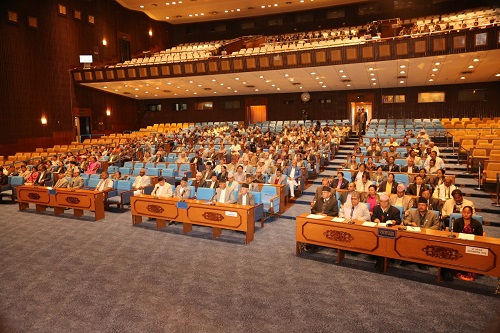

Major political parties have been blamed for not being positive on the issue of representation of persons with disabilities in the parliament. The results of recently concluded elections to the House of the Representatives (HoR) and Province Assembly (PA) has indicated this.
As per the national census-2068, there are 1.94 per cent persons with disabilities in the country. But out of the total 884 lawmakers elected (334 under both the HoR and the National Assembly (NA) and 550 under Province Assembly), there are only three disabled persons elected, which is very minimal, said Chairperson of the Nepal Disabled Women Association, Tika Dahal.
According to the EC, Kaluram Rai of the CPN (UML) has been elected into HoR under the proportional representation category while Prakash Panta into the NA.
Similarly, Laxmi Ghimire is representing in the Bagmati Province from Rastriya Prajatantra Party under the PR category.
Chair Dahal shared, “Political parties are not seen open-hearted on providing tickets to the persons with disabilities under the first-past-the-post electoral system. Although there is representation of Khas-Arya, indigenous nationalities, Madhesi, Dalit, Tharu and Muslim community under the reserve quotas, the persons with disabilities have not been incorporated.”
The mandatory participation of the disabled people in the parliament should be guaranteed even by amending the constitution, she demanded.
The persons with disabilities have been deprived of opportunities despite the manifestos announced by various political parties during the National Assembly election that have claimed the guarantees of their rights including under the PR at the federal, provincial and local levels, she blamed. The Article 86 of the constitution has guaranteed representation of differently abled people while announcing election candidacy.
A lack of representation of the persons with disabilities in the parliament is blamed for apathy and non-responsibilities of political parties, maintained Devi Dutta Acharya, President of the National Federation of the Disabled Nepal.
Although the government has ratified the Convention on the Rights of Persons with Disabilities, 2006 along with its commitments to protect rights of disabled people, its effective implementation has yet to take place, said Raju Basnet, President of the Parents Federation of the Persons with Intellectual Disabilities.
President of the National Federation of the Deaf Nepal KP Adhikari stressed the need for making a common policy for the equal participation of disabled people in the HoR, the NA and the PA.
The Article 84 (3) of the constitution has ensured participation of the persons with disabilities in forming political parties and in the allocation of their membership. Similarly, the Article 176 has guaranteed their participation in the formation of the PA.
—